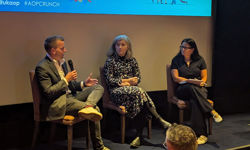
News is not a commodity – but I don’t need to convince you of that. You’ve picked up this magazine, which most likely means you work in the industry or aspire to.
Many people – usually those outside the industry – will tell you the media is dying.
It’s not – it’s changing.
Yes, change is uncomfortable, but it can also be exciting.
It doesn’t mean death; it means innovation and new ways of looking at things.
In March 2017, I became editor of Newsquest’s Berkshire and Buckinghamshire titles. People would say, “Why are you doing that? I wouldn’t touch it with a barge pole. Don’t you know the media is dying?!”, or words to that effect.
When I left earlier this year, newspaper sales were up year-on-year. They had gone from the worst-performing weeklies to the best-performing (and, I believe, still are).
We’d grown our web traffic by an average 120 per cent. That doesn’t look like death to me.
The bottom can be a daunting place to start. But looking at it with an open mind will change the picture. It will allow you to seek out innovation. What’s the worst that can happen? You’re already at the bottom, you may as well give it a try.
Yes, it took blood sweat and tears. It took trying things out – those things failing – trying again, making mistakes.
Here are the lessons I learned along the way, and a little bit of encouragement for anyone finding themselves in a similar situation.
1. You don’t know everything
The most successful, inspiring people I know will tell you one thing – education is a life-long journey. They:
* Embrace change with open arms
* Are willing to listen and try new ways of doing things
Listening is a vital skill at any stage of your journalism career. If you can’t persuade someone to talk to you, and then listen to what they’ve said, you don’t have a story. Not an accurate one, anyway.
Willingness to learn is the first step in achieving your goals.
Our world is constantly evolving – are you going to be a pioneer, or a relic?
2. Go back to basics
Basics are the unsexy, unexciting but essential elements of your work. Let’s jazz them up with an analogy.
Building a brand is like building a good wardrobe – always start with the basics. A wardrobe full of basics will never steer you wrong.
Think of grammar or spelling as a classic white shirt. What does a shirt need to be? Clean, for one. Ironed and crisp. All the buttons need to be in place and the hems tidy.
If it’s stained, yellowing, creased and missing a button or two, it gives the wrong impression.
You can glue on lots of glitter or feathers, or sew on some sequins if you like, but sooner or later, the sequins fall off and the holes are visible once more.
If fashion isn’t your thing, think about how you’d build a house. The foundations first.
A house needs steady foundations. Without those, it topples.
I took a good look at the foundations – what was the house style, fonts – how big was the text? Were all the captions the same style? Folios?
Little things – like referring to a road named ‘Oxford Road’ as ‘the Oxford Road’ – are incorrect and irritate readers.
The term ‘basics’ applies to your website, such as a good upload schedule, engagement, social media posting and making sure you’re consistent every day of the week, including weekends.
3. Listen to your audience
One of the first things I did when I took over at Berks / Bucks was engage with the community. I wrote a letter in the editions asking for honest, genuine feedback. I hosted meet-the-editor sessions (always a gamble!) and went out to meet local charities, rotary clubs etc.
Listening to your audience doesn’t mean taking to heart the trolling.
It means – what will make the difference between your reader picking up a copy of your product and not? Seventy pence (the average cost of a local newspaper) is quite a bit of money to some people.
What will convince a subscriber to renew at the end of their term? What will make someone return to your website time and time again?
What will help your advertising teams secure revenue?
4. Be the authoritative voice
With the rise of community Facebook groups, ‘fake news’ (eurgh) can spread like wildfire. A good example of this happened just the other day; rumours began circulating on social media that a baby had been left at a park. It turned out that the story wasn’t true. But by the time police issued a statement, the ‘news’ was everywhere.
We’re increasingly asked by the administrators of these community groups to clarify the rumours. They’ll post a rumour they’ve heard – then message us and ask us to post saying if it’s not true.
But that isn’t our job. We deal in facts, we’re not here to say, ‘this rumour posted on a Facebook group, it’s untrue’. Doing so dilutes our purpose.
You must stay above the noise, or you have no authority.
Never try to fool or hoodwink your audience. People recognise clickbait – they’re quick to point it out.
If you make a mistake, hold your hands up – people will respect you more. Be honest and clear.
If a story isn’t what you thought it was, or you can’t stack up the angle you thought it had, don’t try and twist the facts to fit your headline.
5. Diversify
Firstly, your workforce. Secondly, your products.
Does our industry reflect the general population of the country? I’d take an educated guess the answer is ‘no’.
If we want to get fresh perspectives, if we want to engage new audiences or reach those who’ve become disengaged, we need to be able to speak to them.
We need diversity in our newsrooms. That’s why schemes such as the Newsquest apprenticeship initiative are good – it helps young people who may not be able to afford the NCTJ course earn whilst they learn.
To sustain our business, we need new ways of capturing and retaining advertisers. What do we have that they want? An audience. But we also have new competition – “why would I pay for an ad on your website when I can spend a couple of pounds on a sponsored Instagram post?”
Your product can no longer just be a newspaper – you need events, magazines, video, podcasts. You’ve got a digital solutions and events company. As editor, you must embrace this new way of thinking.
6. Appreciate your people
Journalism has a poor retention rate which, ultimately, harms our business. Why? Because we’re training youngsters in our newsrooms, we expend time and energy making them into decent journalists … and as soon as they’re qualified, they wave goodbye.
In my experience, the best journalists did not get into the industry for money. They did it because they love what they do. Though the wage is modest, the experiences are second-to-none. In my time as a reporter, I covered murder trials, the Olympics, met the prime minister, interviewed countless famous faces, met the Queen, covered a royal wedding, drove a train, was a firefighter for the day, went to a Wembley play-off, stayed up all night for general elections and the Brexit referendum and helped run campaigns that made a real difference to people’s lives.
Sure, my friends might have been making more money than me – but what price could you put on those experiences?
Nevertheless, we must be sure not to exploit those experiences. We, as an industry, need the best people and if we want to keep them, we must recognise their value.
Just as editors can no longer believe they don’t need to be commercially-minded, employers can no longer rely on the glamour of journalism to get the best people through the door – and, importantly, get those people to stay.
The thrill is the reason we get into journalism – but what makes us stick around?
As a manager, are you communicating with your team? Do they know your latest figures? Do you have goals you are all working towards?
If you want the best from people, cultivate an environment where they can thrive, where ideas are welcome.
And never underestimate the importance of ‘well done’, ‘good job’ and ‘thank you’.
7. There is always a work around – and stress won’t help you find it
Every job has an element of stress. Deadlines, angry customers, unexpected sick days – those happen in every industry. Disasters are part and parcel of the working day; it’s how you deal with them that will determine your success. When these things happen, take a deep breath.
I believe another thing to consider is, is your work environment set up to get the best from your brain? Think about it; how many of your best ideas have come whilst you’ve been sat staring at a screen? I can’t think of one. Those light bulb moments usually happen anywhere but the office, out on a run, reading a book, in the shower.
I’m not advocating that you pop off for a shower every time a stressful situation raises its ugly head. But a 10-minute walk around the block can help dissolve tension.
This is an ideas business. Make sure you have regular space where you can create some.












